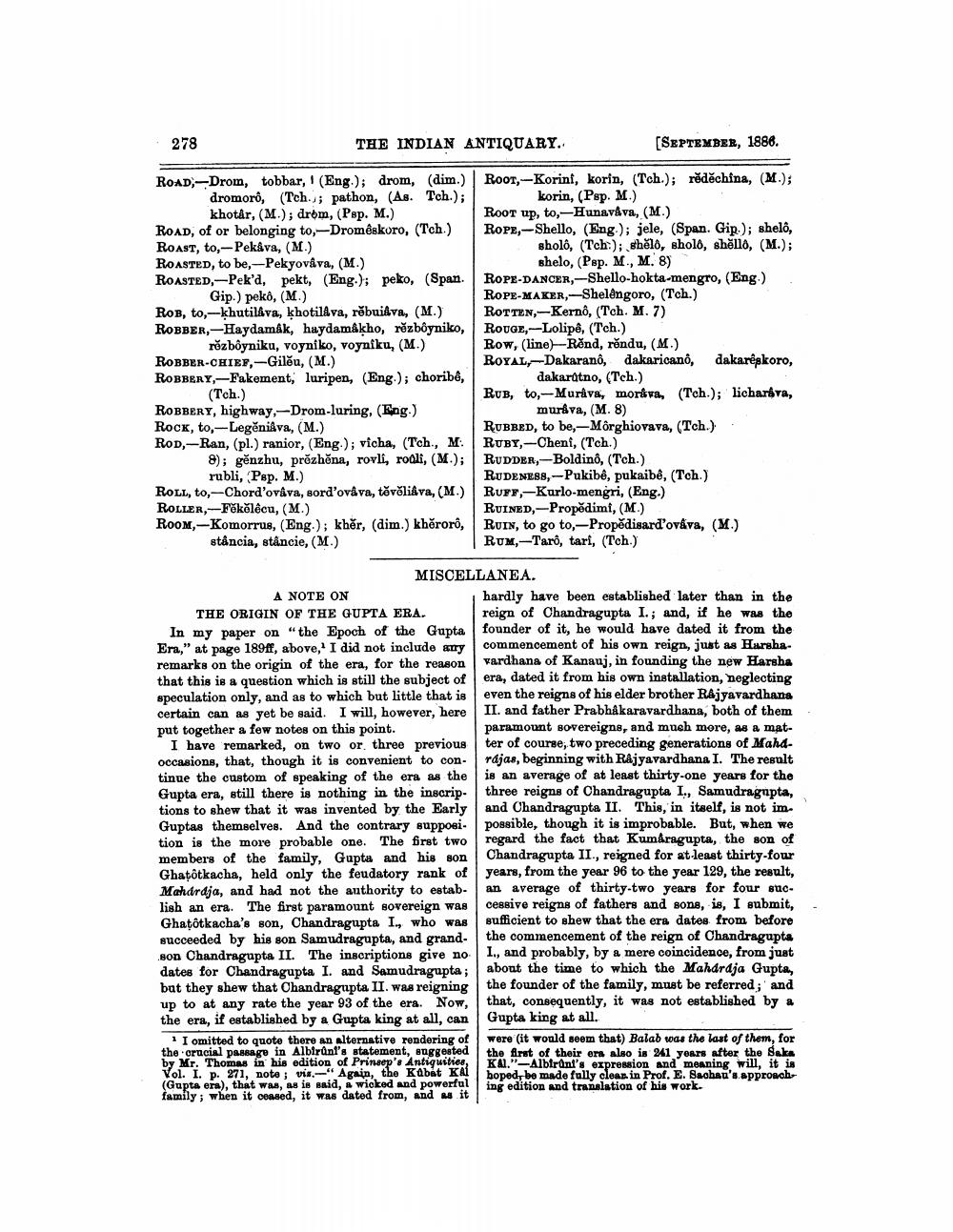________________
[SEPTEMBER, 1886.
ROAD, Drom, tobbar, 1 (Eng.); drom, (dim.) dromorô, (Tch.; pathon, (As. Tch.); khotår, (M.); drom, (Pap. M.) ROAD, of or belonging to,-Dromêskoro, (Tch.) ROAST, to,-Pekâva, (M.)
Roor,-Korint, korin, (Tch.); rěděchina, (M.); korin, (Psp. M.) Roor up, to,-Hunavâva, (M.) ROPE,-Shello, (Eng); jele, (Span. Gip.); shelô, sholô, (Tch); shělô, sholô, shellô, (M.); shelo, (Pap. M., M. 8)
ROB, to,-khutilava, khotilava, rebuilva, (M.) ROBBER,-Haydamâk, haydamâkho, rězbôyniko, rozbôyniku, voyniko, voyniku, (M.) ROBBER-CHIEF,-Gilĕu, (M.) ROBBERY, Fakement, luripen, (Eng.); choribê, (Tch.)
ROASTED, to be,-Pekyovâva, (M.) ROASTED,-Pek'd, pekt, (Eng.); peko, (Span. ROPE-DANCER,-Shello-hokta-mengro, (Eng.) Gip.) pekô, (M.) ROPE-MAKER,-Shelêngoro, (Tch.) ROTTEN,-Kernô, (Tch. M. 7) ROUGE,-Lolipê, (Tch.) Row, (line)-Rend, rendu, (M.)
ROYAL, Dakaranô, dakaricano, dakarêskoro, dakarútno, (Tch.)
RUB, to,-Murâva, morava, (Tch.); licharava, murava, (M. 8)
ROBBERY, highway,-Drom-luring, (Eng.) Rock, to,-Legěniâva, (M.)
ROD,-Ran, (pl.) ranior, (Eng.); vicha, (Tch., M: 8); gěnzhu, prězhěna, rovli, roûli, (M.); rubli, Pap. M.)
RUBBED, to be,-Môrghiovava, (Tech.) RUBY,-Cheni, (Tch.) RUDDER,-Boldinô, (Tch.)
RUDENESS,-Pukibê, pukaibê, (Tch.)
ROLL, to,-Chord'ovâva, sord'ováva, těvěliâva, (M.) RUFF,-Kurlo-mengri, (Eng.) ROLLER,-Fěkolêcu, (M.) RUINED,-Propĕdimi, (M.) ROOM,-Komorrus, (Eng.); khěr, (dim.) khĕrorô,
stância, stâncie, (M.)
278
THE INDIAN ANTIQUARY..
MISCELLANEA.
A NOTE ON
THE ORIGIN OF THE GUPTA ERA. In my paper on "the Epoch of the Gupta Era," at page 189ff, above, I did not include any remarks on the origin of the era, for the reason that this is a question which is still the subject of speculation only, and as to which but little that is certain can as yet be said. I will, however, here put together a few notes on this point.
I have remarked, on two or three previous occasions, that, though it is convenient to continue the custom of speaking of the era as the Gupta era, still there is nothing in the inscriptions to shew that it was invented by the Early Guptas themselves. And the contrary supposition is the more probable one. The first two members of the family, Gupta and his son Ghatotkacha, held only the feudatory rank of Mahardja, and had not the authority to establish an era. The first paramount sovereign was Ghatotkacha's son, Chandragupta I., who was succeeded by his son Samudragupta, and grandson Chandragupta II. The inscriptions give no dates for Chandragupta I. and Samudragupta; but they shew that Chandragupta II. was reigning up to at any rate the year 93 of the era. Now, the era, if established by a Gupta king at all, can
RUIN, to go to,-Propĕdisard'ováva, (M.) RUM,-Tarô, tari, (Tch.)
I omitted to quote there an alternative rendering of the crucial passage in Albirûnf's statement, suggested by Mr. Thomas in his edition of Prinsep's Antiquities Vol. I. p. 271, note; vis. Again, the Kabat Kai (Gupta era), that was, as is said, a wicked and powerful family; when it ceased, it was dated from, and as it
hardly have been established later than in the reign of Chandragupta I.; and, if he was the founder of it, he would have dated it from the commencement of his own reign, just as Harshavardhana of Kanauj, in founding the new Harsha era, dated it from his own installation, neglecting even the reigns of his elder brother Rajyavardhana II. and father Prabhakaravardhana, both of them paramount sovereigns, and much more, as a matter of course, two preceding generations of Mahdrájas, beginning with Rajyavardhana I. The result is an average of at least thirty-one years for the three reigns of Chandragupta I,, Samudragupta, and Chandragupta II. This, in itself, is not im. possible, though it is improbable. But, when we regard the fact that Kumaragupta, the son of Chandragupta II., reigned for at least thirty-four years, from the year 96 to the year 129, the result, an average of thirty-two years for four successive reigns of fathers and sons, is, I submit, sufficient to shew that the era dates from before the commencement of the reign of Chandragupta I., and probably, by a mere coincidence, from just about the time to which the Maharaja Gupta, the founder of the family, must be referred; and that, consequently, it was not established by a Gupta king at all.
were (it would seem that) Balab was the last of them, for the first of their era also is 241 years after the Saka Kal."-Albirini's expression and meaning will, it is hoped, be made fully clear in Prof. E. Sachau's approach ing edition and translation of his work.




